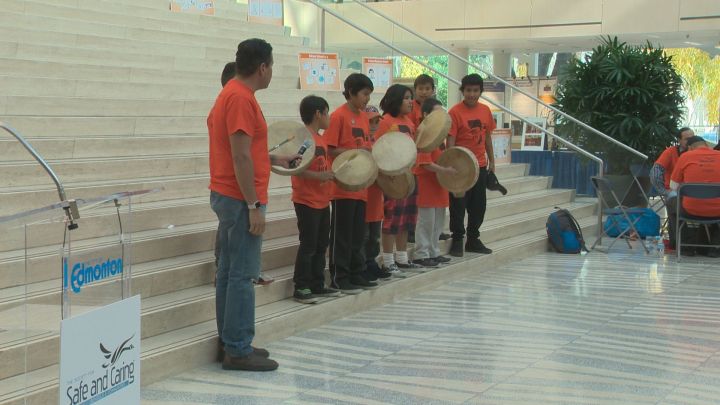A day before similar events will be held across the country, hundreds of Edmontonians gathered at city hall to look back on the painful legacy of Canada’s residential school system and help bring about a spirit of hope for a better future.

The Orange Shirt Day event aims to galvanize Canadians to confront one of the darkest chapters in our country’s history and come together in the spirit of reconciliation between Canada and its First Nations.
“The time for mending and healing is now well on the road as you can see here today,” Métis Elder Terry Lusty, who spent eight years in a residential school in Winnipeg, said at on Friday. “We’re trying to mend those fences and help that process of reconciliation.
“We’ll never forget those times… but we can still move forward.”
Orange Shirt Day began as an event in Williams Lake, B.C. in 2013 to remember residential schools. The orange shirts are a nod to the cruel story of a six-year-old girl named Phyllis, who had her new orange shirt taken away from her on her first day of school at the St. Joseph Mission. It has since seen similar event spring up across Canada.
“We were kids that never had nothing,” Lusty said. “So to have a shirt that was all your own, brand new, is very, very important and to have it ripped away from you was just very traumatic… and that’s just the tip of the iceberg.”
Sponsored by the federal government, the Christian-run residential schools were used to assimilate Indigenous children into white Canadian culture. The practice began in the late 19th century and the last school was closed just in 1996.
About 150,000 Indigenous children attended the residential schools and aside from not being allowed to speak their own language, many were victims of physical and sexual abuse as well as neglect and malnourishment.
READ MORE: Residential school system contributed to current First Nations diabetes epidemic: study
Watch below: On Aug. 18, 2017, Heather Yourex-West filed this report about how new research suggests the residential school system is likely to blame for a high rate of diabetes among Canada’s Indigenous people.

“It was not easy for me because I never had anyone there for me,” Lusty said. “Nobody ever came to visit me, to take me out, because the school I was in, guardians or parents were allowed to come one day per month and take their child for half a day and I used to cling on those wire fences that surrounded the school compound and I used to watch these vehicles come up and pick up the other kids and take them out.
“I’d hang there and wonder, ‘When’s someone going to come for me?’ But nobody ever came.”
In 2008, a formal public apology for residential schools was issued by Prime Minister Stephen Harper. More recently, the stories of residential schools were told through thousands of firsthand accounts delivered to Canada’s Truth and Reconciliation Commission, whose final report provided recommendations for how the federal government can help the country move forward from what happened.
READ MORE: Truth and Reconciliation Commission’s report details atrocities of residential schools
Watch below: In 2015, the dark legacy of Canada’s residential schools was unveiled with the release of the Truth and Reconciliation Commission report. Vassy Kapelos filed this report at the time.
“The date (for Orange Shirt Day) was chosen because it is the time of year in which children were taken from their homes to residential schools, and because it is an opportunity to set the stage for anti-racism and anti-bullying policies for the coming school year,” reads a description of the event on the website orangeshirtday.org.
At Edmonton’s W.P. Wagner High School, a display was set up on Friday in the school cafeteria this week to encourage students to learn more about the history of residential schools.
“The goal is to kind of immerse students in the journey of residential schools from their inception and the reason that they were built,” said Atif Hirjee, a teacher at the school. “All the way up until the point that we’re at now, which is a point of reconciliation, a point of healing.
“I think the message that we’re really trying to give students is that it’s not just people who were affected by residential schools that need to embark on this journey, it’s all Canadians,” Hirjee added. “All Canadians need to work at building community and building bridges to ensure that something like this doesn’t happen again.”
“I feel it helps with the awareness of residential schools because I don’t think a lot of people know what happened,” said Grade 12 student Braden Leahy.
“With the Orange Shirt Day, I feel people start to ask more questions.”
“It’s up to us to see that they don’t happen again and that they don’t happen to anybody else,” Lusty said. “We have a lot of new immigrants coming to this country and I can well imagine some of the things that they’re going through because of their displacement.”
-With files from Kim Smith.








Comments